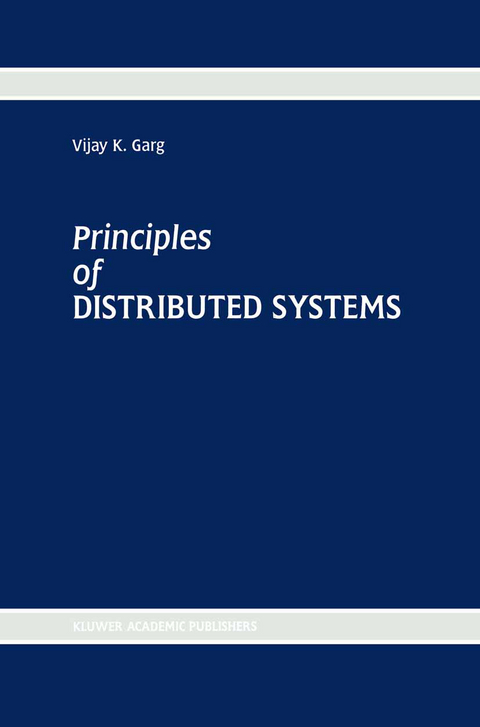
Principles of Distributed Systems
Springer (Verlag)
978-0-7923-9668-0 (ISBN)
Principles of Distributed Systems describes tools and techniques that have been successfully applied to tackle the problem of global time and state in distributed systems. The author demonstrates that the concept of time can be replaced by that of causality, and clocks can be constructed to provide causality information. The problem of not having a global state is alleviated by developing efficient algorithms for detecting properties and computing global functions.
The author's major emphasis is in developing general mechanisms that can be applied to a variety of problems. For example, instead of discussing algorithms for standard problems, such as termination detection and deadlocks, the book discusses algorithms to detect general properties of a distributed computation. Also included are several worked examples and exercise problems that can be used for individual practice and classroom instruction.
Audience: Can be used to teach a one-semester graduate course on distributed systems. Also an invaluable reference book for researchers and practitioners working on the many different aspects of distributed systems.
to Distributed Systems.- Distributed Systems versus Parallel Systems.- Partial Orders.- Notation.- Overview of the book.- Exercises.- Bibliographic Remarks.- 1 Time.- 1.1 Introduction.- 1.2 Model of a distributed system.- 1.3 Logical Clocks.- 1.4 Vector Clocks.- 1.5 Direct Dependency Clocks.- 1.6 Higher Dimensional Clocks.- 1.7 Exercises.- 1.8 Bibliographic Remarks.- 2 Mutual Exclusion.- 2.1 Introduction.- 2.2 Problem.- 2.3 Lamport’s Algorithm.- 2.4 Ricart and Agrawala’s Algorithm.- 2.5 Centralized Algorithm.- 2.6 Dijkstra’s Self-stabilizing Algorithm.- 2.7 Exercises.- 2.8 Bibliographic Remarks.- 3 Global State.- 3.1 Introduction.- 3.2 Consistent Cuts.- 3.3 Global Snapshots of Processes.- 3.4 Global Snapshots of Processes and Channels.- 3.5 Global Snapshots for non-FIFO channels.- 3.6 Applications of Global Snapshot Algorithms.- 3.7 Exercises.- 3.8 Bibliographic Remarks.- 4 Possible Global Predicates.- 4.1 Introduction.- 4.2 Possibility of a Global Predicate.- 4.3 NP-Completeness of Global Predicate Detection.- 4.4 Linear Predicates.- 4.5 Semi-Linear Predicates.- 4.6 Exercises.- 4.7 Bibliographic Remarks.- 5 Conjunctive Possible Global Predicates.- 5.1 Introduction.- 5.2 Weak Conjunctive Predicates.- 5.3 A Vector Clock based Centralized Algorithm for WCP.- 5.4 A Direct Dependence based Centralized Algorithm for WCP.- 5.5 A Vector Clock based Distributed Algorithm for WCP.- 5.6 A Centralized Algorithm for Generalized Conjunctive Predicates.- 5.7 A Vector Clock based Distributed GCP Detection Algorithm.- 5.8 Exercises.- 5.9 Bibliographic Remarks.- 6 Relational Possible Global Predicates.- 6.1 Introduction.- 6.2 Relational Predicate with Two Integer Variables.- 6.3 Relational predicates with N Boolean Variables.- 6.4 Bounded Sum Predicates.- 6.5 Exercises.- 6.6Bibliographic Remarks.- 7 Inevitable Global Predicates.- 7.1 Introduction.- 7.2 Global Sequence.- 7.3 Logic for Global Predicates.- 7.4 Strong Conjunctive Predicates.- 7.5 Algorithms for Detecting SCP.- 7.6 Exercises.- 7.7 Bibliographic Remarks.- 8 Control Flow Predicates.- 8.1 Introduction.- 8.2 LRDAG Logic.- 8.3 Examples.- 8.4 Decentralized Detection Algorithm.- 8.5 Exercises.- 8.6 Bibliographic Remarks.- 9 Order.- 9.1 Introduction.- 9.2 Relationship among Message Orderings.- 9.3 FIFO Ordering of Messages.- 9.4 Causal Ordering Of Messages.- 9.5 Synchronous Ordering of Messages.- 9.6 Exercises.- 9.7 Bibliographic Remarks.- 10 Computation.- 10.1 Introduction.- 10.2 Global Functions.- 10.3 Repeated Computation.- 10.4 Exercises.- 10.5 Bibliographic Remarks.- References.
| Erscheint lt. Verlag | 31.12.1995 |
|---|---|
| Zusatzinfo | XVIII, 254 p. |
| Verlagsort | Dordrecht |
| Sprache | englisch |
| Maße | 155 x 235 mm |
| Themenwelt | Mathematik / Informatik ► Informatik ► Software Entwicklung |
| Informatik ► Theorie / Studium ► Compilerbau | |
| ISBN-10 | 0-7923-9668-5 / 0792396685 |
| ISBN-13 | 978-0-7923-9668-0 / 9780792396680 |
| Zustand | Neuware |
| Haben Sie eine Frage zum Produkt? |
aus dem Bereich


